Welcome to the enchanting kingdom of Bhutan, a hidden gem nestled in the heart of the Himalayas. Renowned for its unspoiled landscapes, rich cultural heritage, and deep spiritual ambiance, Bhutan offers a unique blend of experiences that cater to all kinds of travelers. Whether you are seeking thrilling adventure activities, looking to delve into the tranquility of Bhutan meditation and wellness retreats, eager to explore the Bhutanese festivals and events, or curious about the local village tours in Bhutan, there's something here for everyone. We will uncover the best things to do in Bhutan, from the breathtaking trekking trails in Bhutan to the vibrant Bhutanese cuisine and food experiences. Embrace the opportunity to witness wildlife watching in Bhutan, discover historical sites in Bhutan, and immerse yourself in the Bhutanese arts and crafts. Get ready for an unforgettable journey through the Land of the Thunder Dragon, where every turn brings a new adventure and every moment is a step closer to understanding the essence of this mystical kingdom.
We pride ourselves on being the premier choice for travelers exploring the diverse and captivating wonders of Bhutan. Our deep understanding of this mystical kingdom, combined with our commitment to providing personalized and high-quality services, makes us the best company for guiding you through the myriad of things to do while you are in Bhutan. From meticulously curated itineraries that encompass the breathtaking trekking trails and historical sites, to exclusive access to vibrant Bhutanese festivals and immersive local village tours, our expertise ensures an unparalleled experience. Whether you're seeking adventure, cultural immersion, spiritual enrichment, or culinary delights, our knowledgeable and passionate team is dedicated to crafting a journey that not only meets but exceeds your expectations. With Luxury Holidays Nepal, you're not just embarking on a trip; you're embarking on a journey of discovery, luxury, and unforgettable memories in the heart of the Himalayas.
Cultural Immersion
Cultural Immersion in Bhutan is an integral part of the travel experience, offering visitors a profound understanding and appreciation of this unique Himalayan kingdom. Bhutan's culture is deeply rooted in its Buddhist traditions, and there are numerous ways to immerse yourself in the local way of life.
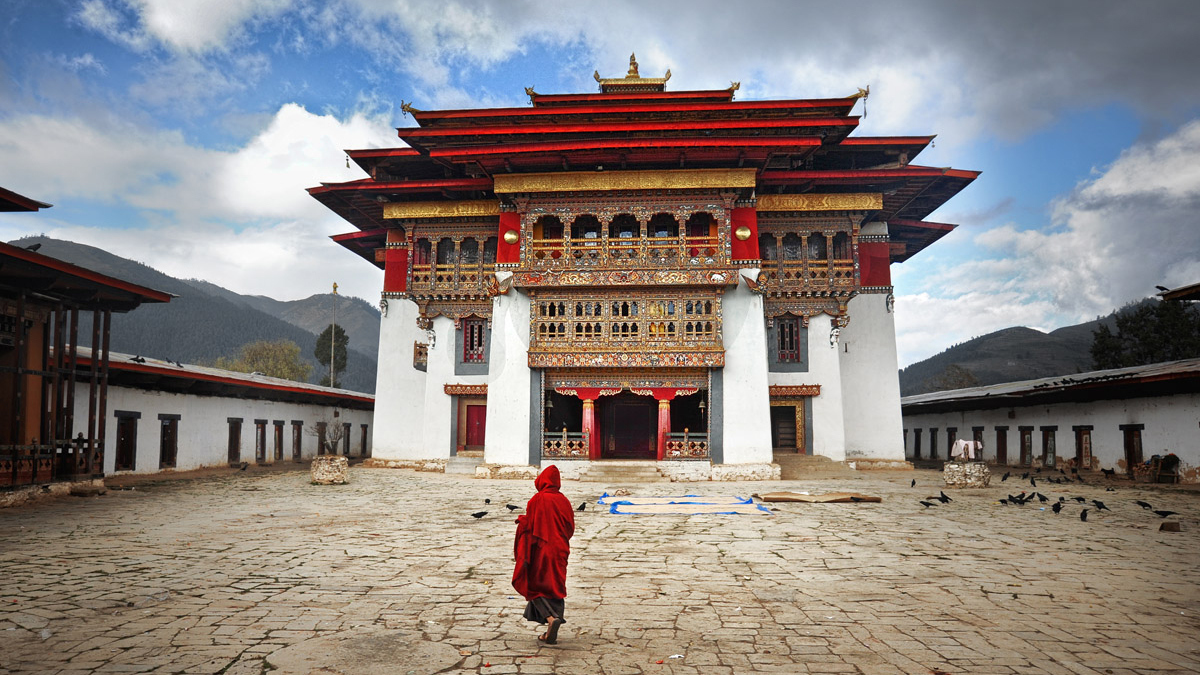
-
Visiting Monasteries and Dzongs: These spiritual and administrative centers are the heart of Bhutanese culture. Iconic sites like the Tiger’s Nest Monastery and Punakha Dzong offer glimpses into the country's religious and historical heritage.
-
Participating in Festivals: Bhutanese festivals, or Tshechus, are vibrant affairs filled with masked dances, music, and religious enactments. Festivals like the Paro and Thimphu Tshechus are fantastic opportunities to witness Bhutanese culture in its most colorful form.
-
Exploring Traditional Arts and Crafts: Bhutan is known for its unique art forms, including Thangka painting, weaving, and sculpture. Visiting arts and crafts schools or local markets allows travelers to observe and learn about these ancient practices.
-
Engaging with Local Communities: Village tours provide a chance to interact with local Bhutanese people, offering insights into their daily lives, traditions, and customs. This can be a humbling experience and a chance to connect on a personal level.
-
Trying Bhutanese Cuisine: Food is an essential aspect of any culture, and Bhutanese cuisine is no exception. Dishes like Ema Datshi (chili and cheese) and Red Rice are staples worth trying. Many places offer cooking classes for a more hands-on experience.
-
Learning Archery: Archery is the national sport of Bhutan, and witnessing an archery tournament is an exciting way to engage with a significant aspect of Bhutanese culture. Some places might even offer lessons for tourists.
-
Attending Buddhist Ceremonies and Rituals: Participating in or observing Buddhist rituals and prayer ceremonies can be a deeply spiritual experience, offering a window into the religious soul of Bhutan.
-
Language and Folklore: Engaging with the local language, Dzongkha, and listening to traditional Bhutanese folklore and stories can enrich your understanding of the local culture and history.
Cultural Immersion in Bhutan is not just about observing; it's about engaging, participating, and respecting the traditions and ways of life that make this country so unique. As you embark on this journey, you are not just a tourist but a respectful learner, ready to appreciate and celebrate the rich cultural tapestry of Bhutan.
Trekking and Adventure
Trekking and Adventure in Bhutan offer some of the most exhilarating and scenic experiences in the world. Nestled in the majestic Himalayas, Bhutan's diverse landscapes provide the perfect backdrop for a range of outdoor activities.
-
Iconic Trekking Trails: Bhutan's trekking routes are legendary, catering to both seasoned trekkers and novices. The Snowman Trek, one of the world's toughest treks, offers an unparalleled challenge. Other popular treks include the Jomolhari Trek, Druk Path Trek, and the Bumthang Cultural Trek, each offering unique landscapes and cultural insights.
-
River Rafting and Kayaking: The rivers of Bhutan, fed by the Himalayan glaciers, provide thrilling opportunities for river rafting and kayaking. The Punakha Valley, with its gentle Mo Chhu and fierce Pho Chhu rivers, is a popular spot for these water sports.
-
Mountain Biking: Bhutan's rugged terrain and less-traveled paths make it an ideal destination for mountain biking enthusiasts. Routes vary from smooth rides through quaint villages to challenging off-road trails in the mountains.
-
Rock Climbing: Though a relatively new sport in Bhutan, rock climbing offers an adrenaline rush for adventure seekers. The natural rock faces near Thimphu provide various routes for beginners and experienced climbers.
-
Archery and Traditional Sports: Participating in or watching archery, the national sport of Bhutan, is a unique experience. Visitors can also try their hand at Khuru (traditional dart throwing), another popular local sport.
-
Wildlife Safaris and Nature Walks: The national parks and wildlife sanctuaries in Bhutan are home to exotic fauna like the Bengal tiger, snow leopard, and red panda. Guided nature walks and wildlife safaris offer opportunities to encounter these rare species in their natural habitats.
-
Paragliding and Hot Air Ballooning: For a bird's-eye view of Bhutan's stunning landscape, paragliding and hot air ballooning are gaining popularity. These activities offer an unforgettable perspective of the country's natural beauty.
-
Fishing: Bhutan's pristine rivers are home to a variety of fish species, making it an ideal destination for fishing enthusiasts. Catch-and-release fishing is a peaceful way to enjoy Bhutan's serene natural environment.
Trekking and Adventure activities in Bhutan not only offer physical challenges and thrills but also provide a unique way to connect with the natural beauty and cultural essence of this Himalayan kingdom. Each adventure is a journey into the heart of Bhutan, revealing aspects of the country that remain unseen to the ordinary traveler.
Spiritual Experiences
Spiritual Experiences in Bhutan are an integral part of the journey for many travelers to this Himalayan kingdom, known for its deep Buddhist traditions and serene environment. Bhutan offers a multitude of spiritual activities that allow visitors to connect with their inner selves and the peaceful essence of the country.
-
Meditation and Yoga Retreats: Many monasteries and retreat centers in Bhutan offer meditation and yoga sessions, providing a tranquil setting for self-reflection and spiritual growth. These retreats often take place in serene locations, surrounded by the natural beauty of the mountains.
-
Visiting Sacred Temples and Monasteries: Bhutan is home to numerous sacred sites, including the famous Tiger’s Nest Monastery (Paro Taktsang), Punakha Dzong, and Rinpung Dzong. These places are not only architectural marvels but also offer a glimpse into the spiritual practices of Bhutanese Buddhism.
-
Participating in Religious Festivals: Attending a Tshechu, a Buddhist religious festival, is a profound spiritual experience. These festivals feature masked dances, religious music, and rituals that are deeply symbolic and offer insights into Buddhist teachings.
-
Pilgrimage Tours: Pilgrimage tours to sacred sites such as the Jambay Lhakhang in Bumthang or the Kurjey Lhakhang are popular among those seeking spiritual enlightenment. These journeys often involve trekking through beautiful landscapes, adding a physical element to the spiritual quest.
-
Buddhist Teachings and Discourses: Engaging with Buddhist monks and participating in spiritual teachings or discourses can enrich one’s understanding of Buddhist philosophy and practices.
-
Prayer Flag Hoisting: The tradition of hoisting prayer flags is a spiritual practice in Bhutan. Visitors can participate in this ritual, which is believed to bring good fortune and spread positive energy.
-
Mindfulness and Nature Walks: Simple activities like mindful walking in the serene valleys or forests of Bhutan can be spiritually uplifting. These walks are an opportunity to connect with nature and practice mindfulness.
-
Hot Spring Therapy: Known locally as Tshachus, Bhutan’s hot springs are not only therapeutic but also hold spiritual significance for locals who believe in their healing powers.
-
Cultural Immersion: Engaging with the local culture, understanding the way of life, and respecting the traditions and customs also contribute to a spiritual journey, offering insights into the harmonious way of living in Bhutan.
Spiritual Experiences in Bhutan are about more than just sightseeing; they are about engaging with the country’s spiritual essence, finding peace, and perhaps, a deeper understanding of oneself. Whether through meditation, attending festivals, or simply soaking in the tranquility of the surroundings, Bhutan offers a myriad of opportunities for spiritual exploration and growth.
Historical Exploration
Historical Exploration in Bhutan is a journey through the rich tapestry of time, where ancient traditions, architecture, and stories come alive. This Himalayan kingdom, with its well-preserved heritage, offers a myriad of opportunities to delve into its fascinating past.
-
Visiting Iconic Dzongs: Dzongs are traditional fortresses that serve as religious, military, administrative, and social centers. Key dzongs to explore include the majestic Punakha Dzong, the imposing Paro Dzong, and the historic Trongsa Dzong. These structures are not only architectural marvels but also repositories of Bhutanese culture and history.
-
Exploring Ancient Temples and Monasteries: Bhutan is dotted with numerous temples and monasteries, each with its own story. The Tiger’s Nest Monastery (Paro Taktsang), clinging to a cliffside, is a must-visit for its historical significance and breathtaking views. Other notable temples include Kyichu Lhakhang, one of Bhutan’s oldest temples, and Jambay Lhakhang in Bumthang.
-
Discovering Bhutanese Royal History: The Royal Family of Bhutan plays a crucial role in the nation's history. Visits to royal palaces and museums, like the National Museum in Paro, offer insights into the royal lineage and Bhutan's journey into modernity while preserving its traditions.
-
Learning at Museums and Cultural Centers: Museums like the Folk Heritage Museum in Thimphu and the Tower of Trongsa Museum provide an in-depth look into Bhutanese lifestyle, art, and culture through the ages. They are treasure troves of historical artifacts, traditional clothing, and tools.
-
Walking Through Historic Villages: Bhutanese villages like Haa and Gangtey are steeped in history. Walking through these villages, with their traditional houses and ancient temples, is like stepping back in time. These villages offer a glimpse into the rural Bhutanese way of life that has remained largely unchanged for centuries.
-
Participating in Traditional Bhutanese Lifestyle: Engaging in traditional activities like archery, textile weaving, and agricultural practices allows visitors to experience aspects of Bhutanese life that have been passed down through generations.
-
Exploring Archaeological Sites: For those interested in ancient history, Bhutan has several archaeological sites that reveal the early human settlement and historical epochs of the country.
-
Attending Cultural Shows and Festivals: Cultural shows and festivals often reenact historical events and legends, providing a colorful and entertaining way to understand Bhutan's past.
Historical Exploration in Bhutan is not just about visiting old sites; it's about experiencing the living history that permeates every aspect of Bhutanese life. From majestic dzongs to humble village homes, every corner of Bhutan offers a window into a past that beautifully coexists with the present.
Wildlife and Nature
Wildlife and Nature exploration in Bhutan is an extraordinary experience, given the country's commitment to environmental conservation and its status as a biodiversity hotspot. The Himalayan kingdom, with its varied ecosystems, offers an array of opportunities for nature lovers and wildlife enthusiasts.
-
National Parks and Protected Areas: Bhutan’s commitment to maintaining a large part of its land under forest cover is evident in its numerous national parks and protected areas. Jigme Dorji National Park, Royal Manas National Park, and Bumdeling Wildlife Sanctuary are some of the prominent ones, each offering unique flora and fauna.
-
Bird Watching: Bhutan is a haven for bird enthusiasts, with over 700 bird species, including the rare and elusive Black-necked Crane, the national bird of Bhutan. The Phobjikha Valley and Bumdeling Wildlife Sanctuary are among the best spots for bird-watching.
-
Trekking and Hiking: Trekking through Bhutan’s diverse terrains is not just an adventure; it’s a way to immerse yourself in the country's natural beauty. The Druk Path Trek, Snowman Trek, and the Bumthang Owl Trek offer stunning views and the chance to encounter wildlife in their natural habitats.
-
Flora Exploration: The rich botanical diversity in Bhutan is impressive. Spring is particularly magical, with rhododendrons, magnolias, and wildflowers in full bloom. The Royal Botanical Garden in Lamperi is a great place to witness this floral spectacle.
-
Butterfly and Insect Watching: With over 600 species of butterflies, Bhutan is also a great destination for enthusiasts of these colorful insects. The diverse climate and untouched natural habitats make it an ideal place for butterfly-watching.
-
Rivers and Lakes: The pristine rivers and lakes in Bhutan are not just beautiful but also hold cultural and spiritual significance. Fishing, kayaking, and simply enjoying the tranquility of these water bodies can be quite refreshing.
-
Wildlife Safaris and Nature Walks: Organized wildlife safaris and guided nature walks in national parks provide opportunities to spot animals like the Takin (Bhutan’s national animal), red pandas, snow leopards, and various species of deer.
-
Photography Tours: For nature photographers, Bhutan’s landscapes offer a plethora of subjects, from panoramic vistas to macro shots of exotic flora and fauna.
-
Camping Under the Stars: Camping in designated areas within the national parks or in the wilderness offers a chance to experience Bhutan's nature up close, under the starlit sky.
Wildlife and Nature exploration in Bhutan is an experience that beautifully blends adventure with ecological awareness and conservation. It’s a journey through untouched forests, across high mountain passes, and into the heart of a country that deeply respects and protects its natural environment.
Festivals and Events
Festivals and Events in Bhutan are a spectacular showcase of the country's rich cultural heritage, deeply rooted in Buddhist traditions. These events offer travelers an authentic and vibrant insight into Bhutanese life, marked by colorful performances, religious rituals, and communal gatherings.
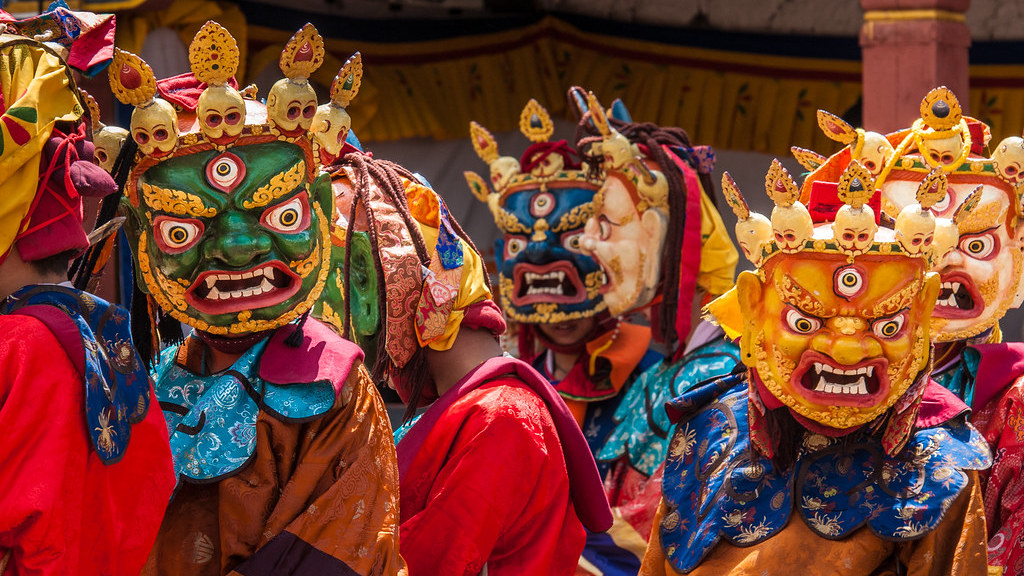
-
Tshechu Festivals: The most famous events in Bhutan are the Tshechu festivals, celebrated in various districts. These religious festivals feature masked dances, known as Cham, performed by monks and laymen. The Paro Tshechu and Thimphu Tshechu are among the most popular, drawing large crowds and offering a glimpse into Bhutanese mythology and spiritual beliefs.
-
Punakha Drubchen: This festival reenacts the 17th-century battle in which Bhutan repelled Tibetan forces. It's a vibrant mix of history and culture, with detailed costumes and dramatic performances.
-
Jambay Lhakhang Drup: Held in Bumthang, this festival is known for its fire ceremony and the dramatic Naked Dance, which is performed at midnight and is believed to bring blessings and ward off evil spirits.
-
Haa Summer Festival: Celebrating the traditional living culture, sports, and religious performances of the nomadic herders of Haa Valley, this festival offers a chance to experience the untouched cultural heritage of this remote region.
-
Black-Necked Crane Festival: Celebrated in the Phobjikha Valley, this festival marks the arrival of the endangered Black-Necked Cranes. It includes cultural programs, crane dances, and environmental conservation-themed dramas and songs.
-
Thimphu Drubchen: Preceding the Thimphu Tshechu, this festival is a less crowded event that offers a more intimate look into the religious aspects of Bhutanese festivals with traditional dances and rituals.
-
Ura Yakchoe: A festival in Bumthang’s Ura valley, where a sacred relic is displayed for blessings. It includes traditional dances and the distinct Yak Dance.
-
Nomad Festival: Held in Bumthang, this festival brings together nomadic herders of northeastern and northwestern Bhutan, showcasing their culture, traditions, and way of life.
-
Matsutake Festival: Celebrating the mushroom season in Bumthang, this festival is a delight for food enthusiasts, offering a chance to sample dishes made with Matsutake, a highly prized mushroom variety.
-
Royal Highlander Festival: Held in Laya, one of the highest settlements in Bhutan, this festival celebrates the highland culture, with unique highlander sports, traditional music, and dances.
Festivals and Events in Bhutan are more than just celebrations; they are a window into the soul of Bhutanese society, illustrating the deep spiritual roots and communal harmony that define this Himalayan kingdom. For travelers, attending these festivals is not only an entertaining experience but also a profound cultural immersion.
Arts and Crafts
Arts and Crafts in Bhutan are a vital aspect of the nation's cultural identity, embodying centuries of tradition, spirituality, and artistic mastery. When visiting Bhutan, exploring its rich artistic heritage offers a unique insight into the Bhutanese way of life.
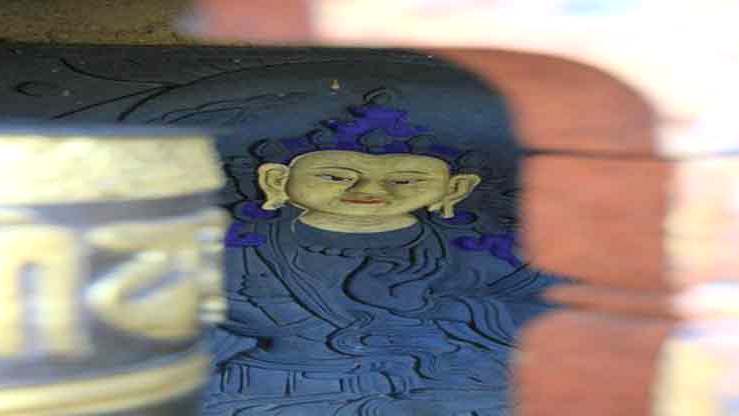
-
Thangka Painting: Thangka, intricate Buddhist religious paintings, are a significant part of Bhutanese art. Visitors can admire these paintings in monasteries and museums, or observe artists at work in Thangka painting schools.
-
Textile Weaving: Bhutanese textiles are renowned for their quality and vibrant patterns. Regions like Bumthang and Lhuentse are famous for weaving, and travelers can visit local workshops to see the skilled artisans at work and purchase handwoven fabrics.
-
Wood Carving and Carpentry: Traditional Bhutanese houses and Dzongs showcase the exquisite woodwork that is central to Bhutanese architecture. Visitors can find beautifully carved masks, furniture, and household items in local markets.
-
Pottery and Ceramics: The art of pottery is another traditional craft, with Bhutanese potters using unique methods to create functional and decorative earthenware.
-
Metalwork: Metal crafts, including bronze casting and goldsmithing, are important in Bhutan. These techniques are used to create religious items, jewelry, and traditional utensils.
-
Paper Making: Bhutanese handmade paper, or Deh-sho, made from Daphne and Edgeworthia plants, is used for scriptures, printing, and souvenirs. Visitors can tour paper-making factories to learn about this eco-friendly craft.
-
Bamboo and Cane Weaving: Bamboo and cane products are common in Bhutanese households. The intricate weaving techniques are used to make baskets, mats, containers, and traditional hats.
-
Arts and Crafts Markets: Places like the Authentic Bhutanese Craft Bazaar in Thimphu offer a range of handicrafts, providing visitors a chance to buy authentic Bhutanese crafts and interact with local artisans.
-
Visiting Artisan Villages: Certain villages in Bhutan are dedicated to specific crafts. For instance, the village of Tashigang is known for its woodwork, while Khoma village is famed for its weaving.
-
Museums and Galleries: Museums like the Royal Textile Academy and Folk Heritage Museum in Thimphu provide deep insights into Bhutanese arts and crafts, displaying historic and contemporary works.
Arts and Crafts in Bhutan are not just products; they are expressions of the country's soul, representing a harmony of Buddhist spirituality, natural beauty, and human creativity. Engaging with these crafts offers a deeper understanding and appreciation of Bhutan's rich cultural heritage.
Photography Opportunities
Photography Opportunities in Bhutan are abundant, thanks to its stunning landscapes, rich culture, and vibrant festivals. Whether you are a professional photographer or a hobbyist, Bhutan offers a plethora of subjects to capture, each telling a unique story about this Himalayan kingdom.
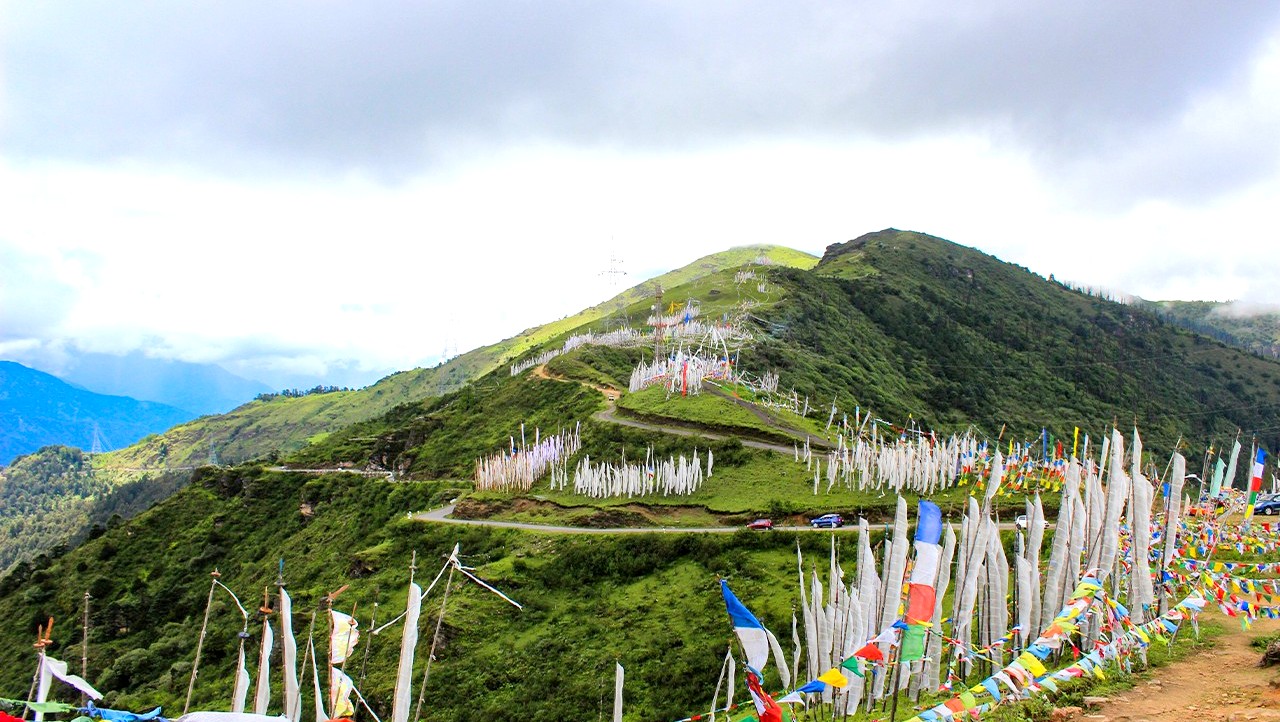
-
Landscape Photography: Bhutan's diverse landscapes, from snow-capped mountains and lush valleys to pristine rivers and forests, provide endless opportunities for breathtaking landscape shots. The view from Dochula Pass, the serene Phobjikha Valley, and the majestic Tiger’s Nest Monastery are some of the must-photograph locations.
-
Cultural and Festival Photography: The colorful and lively Bhutanese festivals, such as the Paro Tshechu and Thimphu Tshechu, offer a chance to capture the vibrancy of Bhutanese culture. The traditional masks, costumes, and dances are perfect subjects for dynamic and culturally rich photographs.
-
Wildlife Photography: For wildlife enthusiasts, Bhutan’s national parks and wildlife sanctuaries are home to a variety of species like the elusive snow leopard, red panda, and the unique Takin. These areas provide excellent opportunities for wildlife photography.
-
Architectural Photography: Bhutan’s unique architectural style, seen in its Dzongs, monasteries, and traditional houses, is a rich subject for architectural photography. Structures like Punakha Dzong and Paro Dzong are not only historically significant but also visually stunning.
-
Portrait Photography: The people of Bhutan, with their traditional dresses and warm smiles, make for compelling portrait subjects. Engaging with locals in rural villages or during festivals can lead to meaningful portrait photography experiences.
-
Street Photography: Bhutan's towns and markets, with their bustling activity and traditional lifestyles, offer great settings for street photography. Places like the Thimphu market or the streets of Paro are ideal for capturing everyday life in Bhutan.
-
Monastic Life and Spirituality: Monasteries are not just architectural wonders but also centers of spiritual life. Photographing monks in prayer, the interiors of prayer halls, and religious artifacts can provide a glimpse into Bhutan's spiritual side.
-
Flora and Macro Photography: The diverse flora of Bhutan, especially during spring when the rhododendrons and wildflowers bloom, is perfect for nature and macro photography.
-
Night Photography: For those interested in astrophotography, Bhutan’s clear skies and minimal light pollution in rural areas offer the chance to capture stunning night skies and star trails.
-
Traditional Arts and Crafts: Capturing the intricate details of Bhutanese arts and crafts, whether it's Thangka paintings, weaving, or sculpture, can make for fascinating subject matter.
Photography Opportunities in Bhutan are as diverse as the country itself. Every corner of this serene and beautiful kingdom offers a chance to capture moments of natural beauty, cultural richness, and deep spirituality. For photographers, Bhutan is not just a destination; it’s a canvas waiting to be explored through the lens.
Bhutanese Cuisine
Bhutanese Cuisine is an integral part of the cultural experience in Bhutan, offering a unique and tantalizing array of flavors that reflect the country's rich heritage and culinary traditions. Sampling the local cuisine is a must-do for anyone visiting Bhutan.
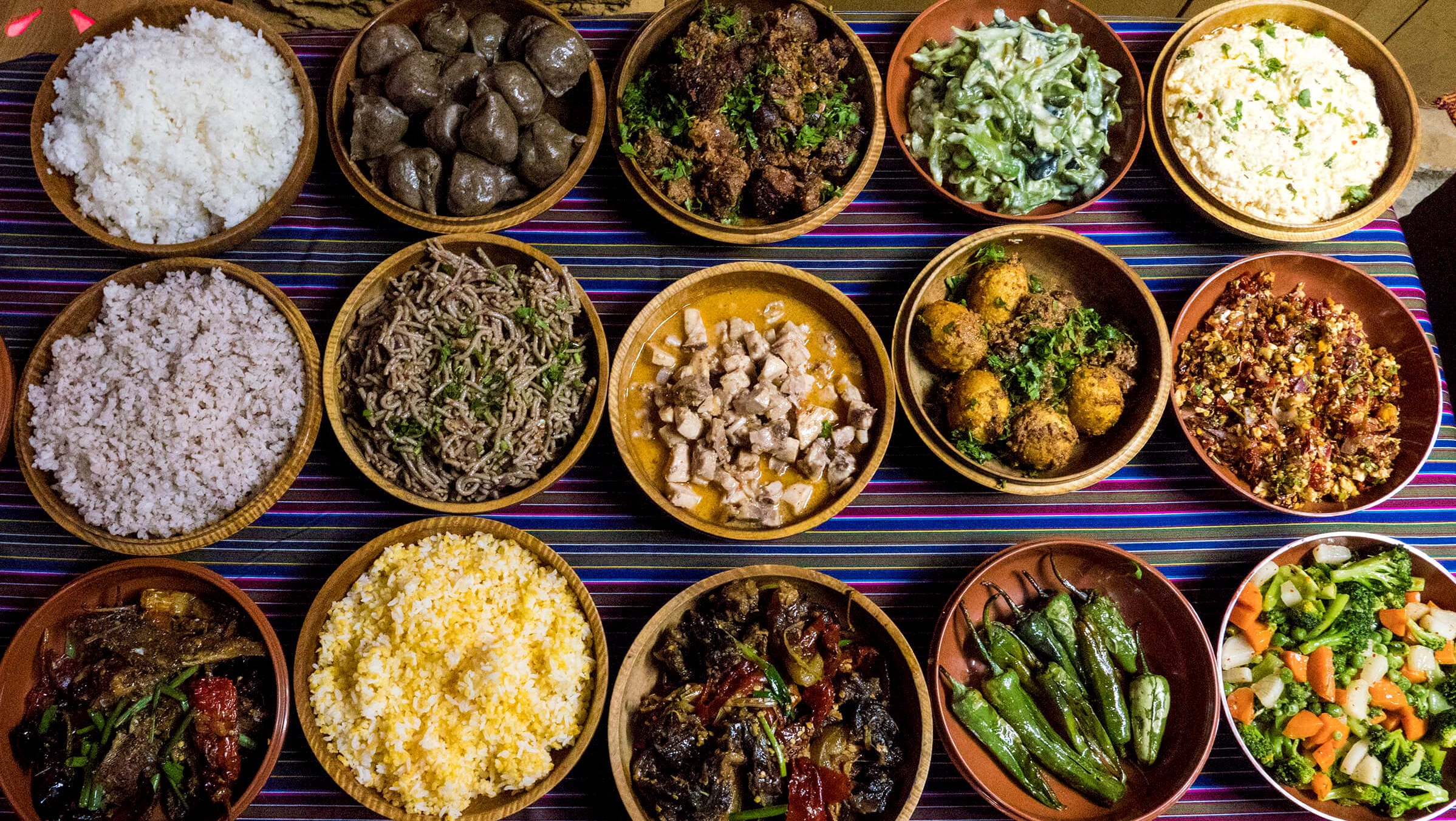
-
Traditional Dishes: The cornerstone of Bhutanese cuisine is the spicy and flavorful Ema Datshi, a dish made with chili peppers and cheese. Other must-try dishes include Phaksha Paa (pork with spicy red chilies), Jasha Maru (spicy minced chicken), and Red Rice, a Bhutanese staple.
-
Street Food and Local Eateries: Exploring local markets and street food stalls is a great way to experience Bhutan's culinary diversity. Foods like Momos (dumplings), Sikkam Paa (dried pork), and Goep (tripe) are popular among locals and tourists alike.
-
Traditional Bhutanese Beverages: Suja, the Bhutanese butter tea, is a unique and comforting drink. Ara, a traditional alcoholic beverage made from rice or barley, is also worth trying for those interested in local spirits.
-
Cooking Classes: Participating in a Bhutanese cooking class is not only a fun activity but also an opportunity to learn about the ingredients, techniques, and flavors that make Bhutanese cuisine so distinctive.
-
Farm-to-Table Experiences: Many restaurants and homestays in Bhutan offer farm-to-table experiences, where you can enjoy organic and freshly prepared meals, often made with locally sourced ingredients.
-
Culinary Festivals: Some regions in Bhutan host culinary festivals, showcasing the diversity of Bhutanese cuisine and offering visitors a chance to taste a variety of dishes and delicacies.
-
Vegetarian Options: Given the Buddhist influence in Bhutan, vegetarianism is common, and most restaurants offer a range of delicious vegetarian dishes that are as flavorful as their non-vegetarian counterparts.
-
Dine with a Local Family: For a truly authentic experience, dining with a Bhutanese family allows visitors to enjoy homemade meals and experience Bhutanese hospitality.
Bhutanese Cuisine is an exploration of tastes and textures, with each dish telling a story of Bhutan’s geography, climate, and culture. It’s a journey that is as much about the food as it is about understanding and appreciating the Bhutanese way of life. Whether it's through the fiery heat of Ema Datshi or the comforting warmth of Suja, Bhutan’s culinary landscape is sure to leave a lasting impression.
Eco-friendly and Sustainable Tourism
Eco-friendly and Sustainable Tourism in Bhutan is deeply ingrained in the country's ethos, aligning with its national policy of Gross National Happiness and environmental conservation. Bhutan's approach to tourism emphasizes sustainability, ensuring that travel experiences are beneficial to both the environment and the local communities.
-
Sustainable Travel Practices: Bhutan encourages responsible travel behaviors that minimize environmental impact. This includes adhering to 'Leave No Trace' principles during trekking and camping, reducing plastic use, and engaging in sustainable activities.
-
Community-based Tourism: Participating in community-based tourism initiatives allows visitors to engage directly with local communities, ensuring that tourism benefits are shared widely. This includes homestays, community-guided tours, and buying local products.
-
Eco-friendly Accommodations: Many hotels and lodges in Bhutan are built and operated sustainably, using local materials, traditional architectural styles, and eco-friendly practices like solar heating and organic farming.
-
Conservation Projects: Travelers can participate in or visit various conservation projects in Bhutan, such as wildlife sanctuaries and environmental research centers, gaining insight into the country’s efforts in preserving its natural heritage.
-
Eco-treks and Nature Walks: Bhutan offers eco-trekking options where the focus is not just on hiking but also on understanding the ecology of the region. These treks often include sessions on local flora and fauna, guided by knowledgeable locals.
-
Cultural Preservation: Engaging in tourism activities that support cultural preservation, such as visiting artisan workshops, traditional festivals, and heritage museums, contributes to sustaining Bhutan’s cultural heritage.
-
Educational Experiences: Many tours in Bhutan are educational, aimed at raising awareness about the importance of environmental conservation and cultural preservation.
-
Supporting Local Economies: By choosing services and products that are locally sourced, tourists can contribute to the local economy, ensuring that the benefits of tourism are distributed throughout the community.
-
Low-Impact Transportation: Using low-impact transportation methods, such as walking, cycling, or electric vehicles, for sightseeing and travel within Bhutan helps reduce carbon footprints.
-
Green Practices in Everyday Tourism: Encouraging and participating in green practices like water conservation, energy saving, and recycling during the stay in Bhutan.
Eco-friendly and Sustainable Tourism in Bhutan is a commitment to preserving the country's pristine environment and rich cultural legacy. By choosing sustainable travel options, visitors not only enjoy a more authentic and meaningful experience but also contribute to the well-being of this extraordinary Himalayan kingdom.
Bhutan offers a mesmerizing blend of experiences for every traveler, from serene spirituality and rich cultural heritage to breathtaking natural landscapes and unique wildlife. Whether you're trekking through its majestic mountains, participating in vibrant festivals, savoring the distinctive flavors of Bhutanese cuisine, or engaging in eco-friendly and sustainable tourism practices, Bhutan promises an unforgettable journey. Each aspect of Bhutanese life, be it arts and crafts, historical explorations, or photography opportunities, tells a story of a nation deeply rooted in tradition yet gracefully evolving. As you embark on your journey to this extraordinary kingdom, be prepared to be captivated by the beauty, simplicity, and tranquility of Bhutan, an experience that is sure to leave a lasting impression in your heart and mind.
FAQs: Things To Do While You Are in Bhutan
Q: Do I need a visa to visit Bhutan?
A: Yes, all international tourists (except for citizens of India, Bangladesh, and the Maldives) need a visa to visit Bhutan. Visas are arranged by your travel agent and are issued upon arrival.
Q: What is the best time to visit Bhutan?
A: The best time to visit Bhutan is during spring (March to May) and autumn (September to November). These periods offer pleasant weather and clear skies, ideal for trekking and attending festivals.
Q: Can I trek independently in Bhutan?
A: Independent trekking is not permitted in Bhutan. All treks must be organized through a registered Bhutanese tour operator and accompanied by a licensed guide.
Q: What are the top festivals to attend in Bhutan?
A: The most popular festivals are the Paro Tshechu and Thimphu Tshechu. Other notable festivals include Punakha Drubchen, Jambay Lhakhang Drup, and the Haa Summer Festival.
Q: Is Bhutan suitable for family travel?
A: Yes, Bhutan is a family-friendly destination with many activities suitable for all ages, including cultural tours, nature walks, and attending festivals.
Q: What kind of accommodation is available in Bhutan?
A: Bhutan offers a range of accommodations, from luxury resorts and boutique hotels to traditional homestays and eco-lodges.
Q: What should I pack for a trip to Bhutan?
A: Packing should include comfortable walking shoes, weather-appropriate clothing, a camera, personal medications, and any specific trekking gear if you plan to trek.
Q: Are there any specific cultural etiquettes I should be aware of?
A: Respect local customs and traditions. Dress modestly, especially when visiting religious sites. Ask for permission before taking photographs of people or religious objects.
Q: What is the currency in Bhutan, and are credit cards widely accepted?
A: The currency is the Bhutanese Ngultrum (BTN). Credit cards are increasingly accepted in hotels and some shops, but carrying cash is advisable, especially in remote areas.
Q: Is English widely spoken in Bhutan?
A: English is widely spoken in tourist areas and is the medium of instruction in schools. Guides and most people in the hospitality industry speak English.
If you need any further information, please contact us by email: at [email protected], Phone: at +977- 985 100 5129 (WhatsApp)




